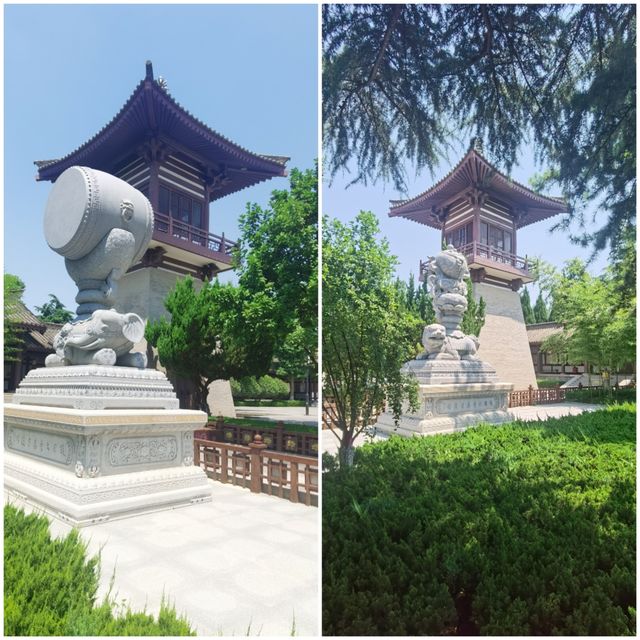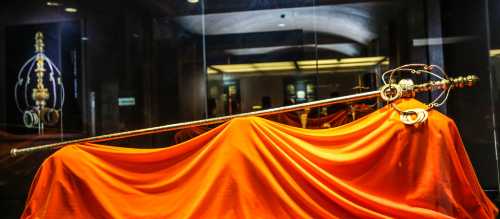Popular Trip Moments
A Short Holiday in Xi'an: Terracotta Warriors and Horses & Famen Temple | Xi'an West Line Tour | Great value family-friendly hot spring resort | So worth it! | Famen Temple: A Spiritual Journey to the Buddhist Kingdom | Guanzhong Style Garden Hot Spring Hotel. | The underground palace opens, and the Tang Dynasty comes to life. | Exploring Millennia of Buddhist Connections: A Spiritual Journey at Famen Cultural Scenic Area | Baoji City God Temple: The temple is filled with the scent of incense and the sound of prayers. Devotees come to worship frequently. | Famen Temple Baoji Xi'an | Shaanxi Baoji Famen Temple | Guan Zhong Buddha Pagoda Underground Palace. | Fanen Temple: Unique Place of Tranquility and Treasure Relics | One-day tour guide to Famen Temple. | Travel Itinerary and Expenses in Baoji (Part Four) | Zhouyuan Stories|The 'Large-Scale' Palaces of the Zhou People | The ancient architectural charm of the 'First City God Temple of Western Guanzhong' | Guanyin Temple in Fufeng County, Shaanxi | The retro wind blows through the internet-famous town | Famen Temple | Famen Temple (51): Han Yu's Memorial on Advising Against the Welcoming of Buddha's Relics | Famen Temple | Roaming in the snow at Famen Temple | Famen Temple in Baoji, recommended tour route | Famen Temple, also known as Fayun Temple, is located in Famen Town, Fufeng County, Baoji City, Shaanxi Province, and is known as the 'ancestor of Guanzhong pagoda temples' | Baoji!!!
Popular Travel Types
Recommended Attractions at Popular Destinations
Bangkok attraction near me | Manila attraction near me | Tokyo attraction near me | Taipei attraction near me | Hong Kong attraction near me | Seoul attraction near me | Kuala Lumpur attraction near me | Los Angeles attraction near me | Shanghai attraction near me | New York attraction near me | Shenzhen attraction near me | Osaka attraction near me | Singapore attraction near me | London attraction near me | Guangzhou attraction near me | San Francisco attraction near me | Beijing attraction near me | Macau attraction near me | Bali attraction near me | Jakarta attraction near me | Paris attraction near me | Ho Chi Minh City attraction near me | Istanbul attraction near me | Phuket attraction near me | Chicago attraction near me | Seattle attraction near me | Toronto attraction near me | Orlando attraction near me | Cebu attraction near me | Chiang Mai attraction near me
Popular Attractions
Chiang Mai Night Safari | Hong Kong Disneyland | Ta Keo | Redwoods – Whakarewarewa Forest | Shanghai Astronomy Museum | SanGimignano | Shanghai Natural Wild Insect Kingdom | Sky Tower | Bund Sightseeing Tunnel | Boracay | Universal Studios Hollywood | Las Vegas Shows | Beringharjo Market | Residence of Bruce Lee | Budapest Zoo & Botanical Garden | Oct Harbour Plus | médiéval de Hautpoul Garden | Fábrica de Colores | Kallikkodan Kaavu Temple | Masia Freixa | Grote Bartholomeus kerk | Lookout | Rhigos Viewpoint | Hanuman Temple | Estatua Jose De La Borda | Manoj Kumar Studio | Eling Park | Bipenggou | Auckland Zoo | Ba Na Hills
Popular Restaurants in Fufeng County
魏家羊肉館 | 農家大院 | 麥迪堡 | 農家樂008號 | GUAN ZHONG FENG QING YUAN JUN YUE LOU | 山門食府 | 佛光閣酒店餐廳 | Guanzhongfengqingyuanhuibinlou | 老孫家手工擀麪皮 | 膳緣居 | Sichuan Restaurant | 東北木火鐵鍋燉魚村 | 西府小吃 | HAO LIU YUN YUN NONG GU LE | JIN DA WAN NIU ROU LA MIAN | 又見咖啡 | 吾樂素飲 | XIAO HUANG LOU XIANG LA HAI XIAN YUAN | 上林苑餐廳 | 胖嫂面莊 | 老八羊肉泡 | 扶風臊子面 | Tianlongbaoyansushiguan (chongzhenglu) | 大佛飯店 | 陝西華彬雷迪森温泉酒店·繁華里 | 法門寺佛光閣大飯店 | 法門素食 | 岐山面 | 口口香擀麵皮 | 唐師傅臊子麪辣子麪
Popular Ranked Lists
Top 3 Best Things to Do in Dezhou | Top 4 Best Things to Do in Lu'an | Popular Luxury Hotels Near La Coruna | Popular Premium Hotels in La Rioja | Popular Luxury Hotels Near Nachikatsuura | Popular Luxury Hotels Near Berchtesgaden | Popular Local Restaurants in Pattaya | Popular Premium Hotels in Chatham | Popular Local Restaurants in Qingdao | Popular Premium Hotels Near Birmingham | Popular Luxury Hotels Near Blackpool | Popular Local Restaurants in Yantai | Top 7 Premium Hotels in Famagusta District | Top 11 Best Things to Do in Jinhua | Top 3 Best Things to Do in Ziyang | Top 11 Best Things to Do in Krabi | Popular Luxury Hotels Near Nicosia | Top 4 Best Things to Do in The Rocks | Popular Best Things to Do in Zhumadian | Top 8 Best Things to Do in Qujing | Top 19 Local Restaurants in Milan | Popular Premium Hotels in Remah | Popular Local Restaurants in Shanghai | Top 15 Local Restaurants in Sydney | Top 7 Best Things to Do in Chifeng | Top 3 Best Things to Do in Dazhou | Popular Local Restaurants in Dalian | Popular Local Restaurants in Hangzhou | Top 20 Local Restaurants in Jinan | Top 5 Premium Hotels in Lecce
Payment Methods
Our Partners
Copyright © 2025 Trip.com Travel Singapore Pte. Ltd. All rights reserved
Site Operator: Trip.com Travel Singapore Pte. Ltd.
Site Operator: Trip.com Travel Singapore Pte. Ltd.










